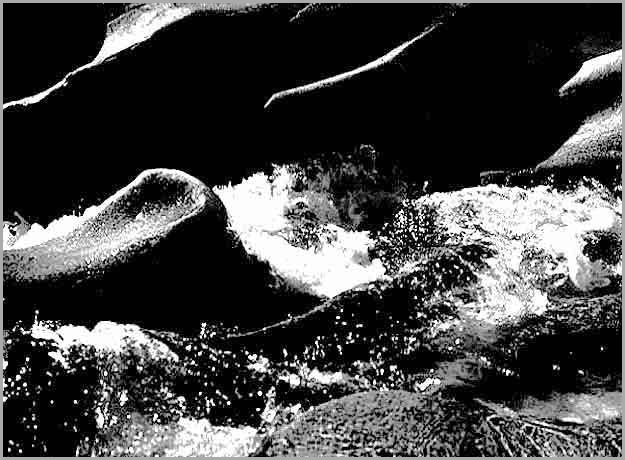
O be aroused by the flame
wherein the one thing that eludes
you in change shines forth;"
from the Second Part
of the Sonnets to Orpheus
by Rainer Maria Rilke
This week, an image of Flowforms
in Granite. Also: a new translation
from the German.
August: Water, Granite and the Poetry of Change
XII [ZWEITER TEIL]
Wolle die Wandlung. O sei für die Flamme begeistert,
drin sich ein Ding dir entzieht, das mit verwandlung prunkt;
jener entwerfende Geist, welcher das Irdische meistert,
liebt in dem Schwung der Figur nichts wie den wendenden Punkt.
Was sich ins Bleiben verschließt, schon ists das Erstarrte;
wähnt es sicher im Schutz des unscheinbaren Grau's?
Warte, ein Härtestes warnt aus der Ferne das Harte.
Wehe—:abwesender Hammer holt aus!
Wer sich als Quelle ergießt, den erkennt die Erkennung;
und sie führt ihn entz¨¨ckt durch das heiter Geschaffene,
das mit Anfang oft schließt und mit Ende beginnt.
Jeder glückliche Raum ist Kind oder Enkel von Trennung,
den sie staunend durchgehn. Und die verwandelte Daphne
will, seit sie lorbeern fühlt, daß du dich wandelst in Wind.
XII [SECOND PART]
Desire transformation. O be aroused by the flame
wherein the one thing that eludes you in change shines forth;
every designing mind which has mastered the earthly
loves in the figure's swing nothing more than the turning point.
What encloses itself in stasis, already is Rigidity;
does it believe itself protected under the plain of gray?
Wait, from afar the hardest warns that which is hard.
Woe—: the absent hammer is ready to strike!
Whoever pours forth as a spring, is recognized by Recognition;
and she leads him enraptured through all of cheerful creation
that often with opening closes and with ending begins.
Every happy space is child or grandchild of separation,
which they undergo amazed. And the transfigured Daphne, *
now that she's laurel, wishes you change yourself into wind.
*
In classic Greek mythology,
Daphne was a
mountain nymph who was loved
by the god, Apollo. As the story goes, Leucippus, a mere mortal, also loved
Daphne and disguised himself as a nymph in order to win her affection. When
the other nymphs discovered his deceit, they turned upon him and killed
him.
Afterwards, Apollo continued to pursue Daphne, but her cry for help was
heard
by her father, a river god, who, in order to protect her, transformed her
into a
laurel tree. Apollo then made a pledge that the laurel tree would remain
eternally green and took it as his symbol.
The tale of Apollo and Daphne's transformation into laurel tree received
its
most famous form in the Latin poem in 15 books,
The
Metamorphoses (c.AD 8),
Ovid's masterpiece. This work was first translated into English some 15
centuries later, by Arthur Golding.
| see also
the Rilke
Posters |
| listen to other recordings in English and German of twelve poems from
The Book of Images at
The Rilke
Download Page
(#
Includes
instructions) |
See other recent additions of new English translations of
Rilke's poetry,
together with
featured photographs at:
(11) August: Children, Mountains and the Poetry of Praise
(12) July: Lilies of Paradise and the Poetry of Praise

|
See also another website by Cliff Crego: The Poetry of Rainer Maria Rilke |
a presentation of 80 of the best poems of Rilke in both German and new English translations: biography, links, posters |
|
See also: new |
|
"Straight
roads, Slow rivers, Deep clay." |
A collection of contemporary Dutch poetry in English translation, with commentary and photographs by Cliff Crego |